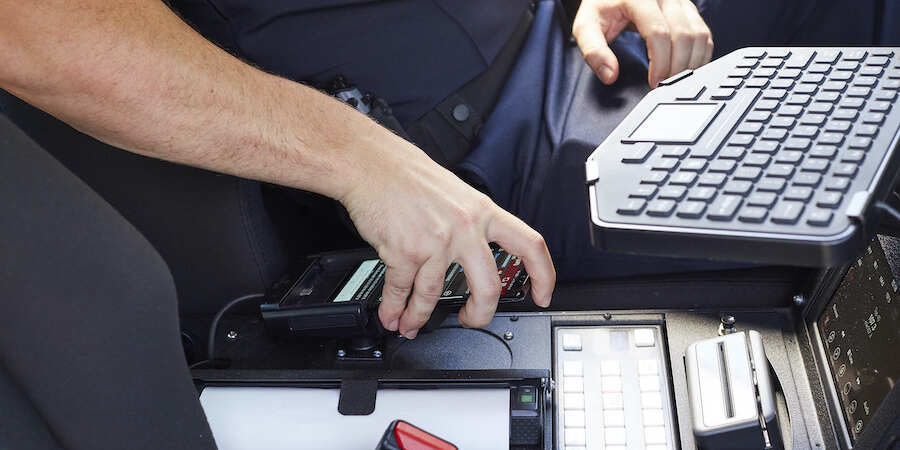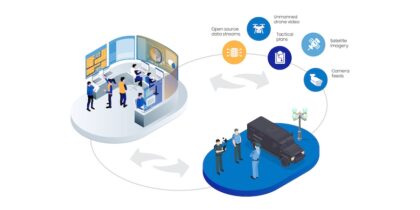Smartphones are quickly becoming essential to law enforcement agencies — and with good reason. The latest smartphones can replicate the performance of patrol car computers. With the freedom to take that computing power on foot, officers can better engage with the community.
Now, technology like Samsung DeX — short for desktop experience — is making it even easier for smartphones to go solo and serve as the single device supporting an officer at the station, in the vehicle and in the field.
Samsung introduced DeX at law enforcement trade shows in 2017, and forward-thinking police chiefs immediately saw its potential for patrol cars. To use DeX, officers just pair a Galaxy smartphone with the vehicle-mounted display and keyboard. Major equipment suppliers like Gamber-Johnson and Havis have even designed DeX-specific mounts and supporting equipment so officers can use the technology to its full potential.
Streamlining officers’ workload
Smartphones already offer unprecedented mobile utility, and pairing them with DeX makes them even more valuable to police operations. In many law enforcement agencies, officers in the field perform tasks that require documentation such as photographs, videos or voice recordings, all of which can be collected on a smartphone. Using a single device for data collection and processing simplifies the entire workflow, and eliminates the need to switch back and forth from in-vehicle technology to a mobile device or desktop.
Get the Samsung DeX study for public safety
Download the Public Safety Network's in-depth cost comparison on Samsung's DeX in-vehicle solution. Download Now
With DeX, a Galaxy smartphone can function as a patrol car’s computer, and the officer gains a larger touchscreen and keyboard. DeX optimizes mobile apps to make full use of the larger display rather than simply “stretching” the smartphone’s interface. This true desktop experience saves officers from trying to view everything in a mobile format, so it’s easier for them to work on bigger projects, such as incident reports, suspect identification and crime scene review.
With a smartphone at the center of their workflow, a police officer no longer has to rely on radio transmissions and vague descriptions. Instead, they can receive more enhanced information, like high-res images, videos and detailed reports — which significantly improves their situational awareness and lessens the uncertainty surrounding incidents not yet responded to.
When it comes to real-time communication, DeX allows full smartphone use and lets officers easily keep up with relevant messages and emails while they’re away from the station. DeX also improves in-vehicle officer safety with less intrusive equipment, which can save an officer’s life if they get into an accident.
Additional benefits of DeX
DeX offers substantional organizational cost savings by allowing departments to replace expensive in-vehicle computers, which can require significant IT support. Agencies that switch to DeX can lower their upfront hardware costs and overall IT overhead — with added security. A 2018 case study by the Public Safety Network demonstrates how agencies can go easy on their budget by transitioning to a mobile-centric workforce. When officers use the same device both in and out of the car, the agency’s operations are streamlined. The officers gain improved user experience, and agency leaders save time on technology training.
On DeX’s intuitive interface, the information, audio recordings, photos and notes stored on an officer’s smartphone can be efficiently uploaded or transferred within the secure, department-controlled records management system. And mobile security measures remain active even when the smartphone is docked. Because Samsung smartphones are automatically equipped with Samsung Knox, they can move through various work environments while keeping data in a secure architecture that supports full interaction with criminal justice systems. Knox can also help agencies access criminal justice information (CJI) databases in compliance with Criminal Justice Information Services (CJIS) policy.
The more an officer can do with a single device, the more they can do in the field to effectively help the community. For law enforcement agencies that want to make the most of today’s technology and provide a powerful force multiplier for their field personnel, DeX brings a whole new layer of opportunity.
Interested in achieving CJIS compliance on your smartphones? Check out our free Comprehensive Guide to CJIS Compliance in a Mobilized Agency. Or see how much you could save by leveraging Samsung DeX with our free cost calculator.









